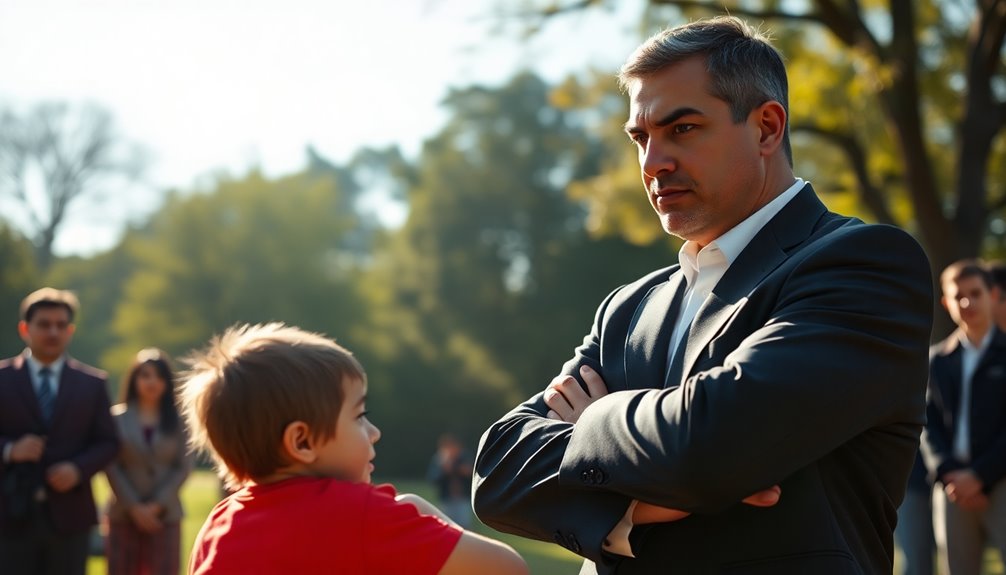Tiger dad parenting is all about strict discipline and high academic expectations. You'll find that this style focuses on achievement, often at the expense of emotional well-being. It's rooted in cultural values that prioritize hard work and family honor, leading to intense pressure on kids. While some argue it fosters success, critics highlight the risks of anxiety, low self-esteem, and a lack of joy in accomplishments. Unlike more nurturing styles, tiger parenting often stifles creativity and independence. If you're curious about the future of this approach and its emotional implications, there's more to uncover.
Key Takeaways
- Tiger dad parenting emphasizes high achievement and strict discipline, often prioritizing academic success over emotional well-being and personal exploration.
- Critics argue that this parenting style can lead to increased anxiety, lower self-esteem, and mental health issues in children.
- Cultural influences, particularly from Asian traditions, shape the tiger dad approach, focusing on respect for authority and familial honor in academic success.
- Comparatively, the tiger parenting style contrasts with more nurturing methods, such as authoritative parenting, which balances high expectations with emotional support.
- Future trends indicate a shift towards holistic parenting methods that prioritize emotional health alongside academic rigor for balanced child development.
Understanding Tiger Dad Parenting

Tiger dad parenting represents a distinct approach to raising children, marked by a stringent focus on achievement and discipline. This style often draws inspiration from the tiger mom parenting style, which emphasizes high expectations and rigorous routines. If you're familiar with Amy Chua's *Battle Hymn of the Tiger Mother*, you'll recognize the pressure it places on children to excel academically and in extracurricular activities.
While this approach can foster a strong work ethic, it also leads to significant academic pressure. You might find that children raised under tiger dad principles experience heightened anxiety and a sense of family obligation, potentially impacting their GPAs negatively. Critics warn that the intense focus on achievement can result in adverse mental health outcomes, including increased rates of depression.
Moreover, the non-negotiable routines typical of tiger dad parenting, like daily study sessions, aim to cultivate discipline. However, studies indicate that overly controlling parenting styles can stifle emotional development and creativity.
Balancing achievement with well-being remains a contentious topic, prompting ongoing discussions about how best to nurture your child's potential without compromising their mental health.
Key Traits of Tiger Dads

Emphasizing achievement and discipline, key traits of tiger dads create a structured environment for their children. This parenting style is rooted in tough love, demanding high academic performance while instilling a strong work ethic through rigorous schedules. Non-negotiable commitments, such as music lessons or homework, are typical, aiming to elevate children's achievements.
| Trait | Description |
|---|---|
| Strict Discipline | Enforces rules and expectations for behavior. |
| High Academic Standards | Prioritizes education and success above all else. |
| Rigorous Scheduling | Implements structured routines, often with no flexibility. |
| Emotional Pressure | Creates an environment that may lead to anxiety and lower self-esteem. |
While these traits foster discipline, they can inadvertently stifle creativity and emotional well-being. Many children raised under this approach report feelings of obligation rather than joy in their accomplishments. Critics argue that this relentless pressure often ties self-worth to achievements, leading to social competence issues. Understanding these traits helps clarify how tiger dads shape their children's experiences and development, for better or worse.
Cultural Context and Influences

When you consider the Tiger Dad parenting style, it's crucial to recognize how cultural variations shape these approaches.
Historical influences and societal expectations play a big role in defining what success looks like in different communities.
As you explore this topic, you'll see how these factors contribute to the ongoing dialogue about discipline and emotional well-being in parenting.
Cultural Parenting Variations
Cultural context greatly shapes parenting styles, influencing how families approach child-rearing and define success. In many Asian cultures, for instance, the "Tiger Dad" style emphasizes strict discipline and high academic achievement. This approach reflects cultural expectations that prioritize hard work and success, often at the expense of a child's emotional well-being.
Conversely, Western cultures typically embrace cultural parenting variations that focus on individuality and self-expression. In these environments, nurturing relationships and emotional support take precedence over rigid academic standards.
Research shows that children raised in authoritarian settings like those using the Tiger Dad method may face increased academic pressure, anxiety, and depressive symptoms. This stark contrast highlights the ongoing debate in society about the effectiveness of strict versus nurturing parenting approaches.
Media representations, such as "Tiger Mum, Cat Dad," further illustrate the differing philosophies and their implications for child development. Furthermore, understanding the impact of predictive modeling can help identify at-risk students and guide interventions that promote emotional well-being alongside academic success.
Ultimately, understanding cultural parenting variations is essential. It allows you to appreciate how societal norms and values influence parenting practices, leading to diverse definitions of success and varying child-rearing strategies across cultures.
Historical Influences on Parenting
Understanding the roots of parenting styles reveals how historical influences shape contemporary practices. The "Tiger Dad" style, popularized by Amy Chua, draws heavily from traditional Chinese cultural values that emphasize academic achievement and discipline. This approach is grounded in Confucian principles, which prioritize respect for authority, hard work, and education as foundational elements for personal development. Additionally, strong communication skills can play a vital role in bridging the gap between strict expectations and emotional expression.
In contrast to Western parenting styles that often champion individuality, the "Tiger Dad" model embraces a collectivist perspective. Here, children's accomplishments are seen as a reflection of family honor and pride. This cultural context is particularly evident among immigrant families from East Asia, where rigorous parenting practices often arise as a response to societal pressures and the aspiration for upward mobility in a new environment.
Research shows that while children raised in strict environments, like those following the "Tiger Dad" philosophy, may demonstrate high academic performance, they also face increased levels of stress and anxiety. Moreover, it is crucial to acknowledge that emotional expression can be an important factor in children's overall well-being, which may be overlooked in stricter parenting styles.
Historical influences on these parenting styles underscore the complexities of raising children in a rapidly changing world, highlighting the balancing act between cultural expectations and modern challenges.
Societal Expectations and Norms
Societal expectations heavily influence parenting styles, shaping how parents approach their roles across different cultures. In Western societies, you might find a focus on individuality and personal expression, while Eastern cultures, particularly among Chinese families, often prioritize achievement and discipline.
This cultural backdrop gives rise to the "Tiger Mother" phenomenon, where strict discipline and high demands characterize parenting. As you observe these differing norms, media portrayals, like the TV drama "Tiger Mum, Cat Dad," fuel public debates about the effectiveness of Tiger Parenting versus more lenient approaches.
While children raised in authoritarian environments may excel academically, research suggests they can also face higher levels of anxiety and depression due to the immense pressure placed on them.
You might notice a generational shift as well; younger parents increasingly lean towards permissive and supportive methods, reflecting changing societal values. This evolution points to a growing recognition of the need for balance between achievement and emotional well-being.
Ultimately, understanding these societal expectations can help you navigate your own parenting style, whether you lean towards the Tiger Mother approach or adopt a more nurturing strategy.
Impact on Child Development

When you think about the Tiger Dad parenting style, consider how the intense academic pressure can affect your child's emotional well-being.
This approach often leads to increased anxiety and a sense of obligation that can overshadow their happiness.
Balancing discipline with support might be the key to fostering both achievement and emotional health in children.
Academic Achievement Pressure
Tiger parenting often creates an environment of intense academic achievement pressure, which can greatly impact a child's development. When you push your child to excel academically, they might feel overwhelmed by the fear of failure. Research shows that children raised in this strict environment can experience heightened anxiety and depression.
Despite your good intentions, this pressure may lead to lower GPAs compared to their peers, as the intense focus on success can stifle their motivation and creativity.
Additionally, the lack of autonomy in tiger parenting can hinder your child's ability to develop self-regulation skills. Without opportunities to face challenges independently, they may struggle to cope with setbacks later in life.
While structure is beneficial, excessive control can negatively affect personal growth and emotional outcomes. Positive psychology indicates that a supportive environment fosters happiness, which is vital for successful academic achievement. Moreover, understanding the impact of emotional dysregulation can help parents create a more balanced approach to nurturing their child's potential.
As a result, if you prioritize achievement over emotional well-being, you might inadvertently create barriers to your child's success. Balancing expectations with encouragement can help nurture their potential while fostering a healthier relationship with learning.
Emotional Well-being Concerns
Emphasizing achievement over emotional well-being can have serious repercussions for your child's development. When you adopt a tiger dad approach, the pressure to excel academically can lead to heightened anxiety and depression in your child.
The strict expectations often overshadow their emotional needs, which can negatively impact their self-esteem and overall happiness.
Consider the following concerns regarding emotional well-being:
- Increased academic pressure can result in anxiety and depression.
- High behavioral standards may lower your child's GPA and self-worth.
- A lack of personal exploration stifles creativity and emotional growth.
- High-pressure environments can strain mental health and social relationships.
- Children raised in high-pressure environments may develop emotional dysregulation, leading to challenges in managing their feelings effectively.
- Balancing discipline with emotional support is essential for overall success and happiness. Regular physical activity can also help manage stress and improve emotional resilience, as engaging in high vibrational energy activities enhances mental well-being.
- Recognizing the importance of emotional support can help mitigate these negative effects and promote healthier development.
Comparisons With Other Parenting Styles

While tiger parenting is known for its strict discipline and high expectations, it stands in stark contrast to other parenting styles that prioritize emotional well-being and independence.
Permissive parenting, for instance, adopts a lenient approach with minimal rules, allowing children more freedom to explore but potentially lacking the structure needed for academic success.
In contrast, authoritative parenting strikes a balance, combining high demands with warmth and open communication, which is often absent in tiger parenting. This can lead to lower self-esteem in children subjected to the rigid expectations of tiger moms.
Intensive styles like tiger parenting can induce significant pressure and anxiety, while exploratory styles, such as free-range parenting, encourage independence through unsupervised play.
Research shows that children raised under tiger parenting may experience higher rates of depression and anxiety due to overwhelming academic pressure, contrasting sharply with the emotional benefits of nurturing approaches like attachment parenting.
Furthermore, the tiger mom approach, centered on achievement, can backfire, resulting in lower GPAs and a heightened sense of family obligation, unlike dolphin dad parenting, which emphasizes encouragement and relaxation to foster learning and happiness.
Criticisms and Controversies

The strict discipline and high expectations associated with the Tiger Dad parenting style have sparked significant criticism and controversy. Critics argue that this approach can lead to lower self-esteem and increased anxiety in children, which research supports by linking it to poorer psychological outcomes. Concerns also arise about reinforcing harmful cultural stereotypes, as well as neglecting emotional well-being for academic success.
Here are some common criticisms of the Tiger Dad approach:
- It may result in diminished self-esteem and heightened anxiety among children.
- The focus on strict discipline can overshadow the importance of emotional support. Establishing healthy boundaries can help ensure that children feel respected and valued.
- Critics suggest that happiness and well-being should be prioritized alongside academic achievement.
- This parenting style may stifle independence and self-expression in children.
- The debate has prompted discussions on the effectiveness of nurturing, flexible parenting styles.
Amy Chua, author of Battle Hymn of the Tiger Mother, recognizes that while strict parenting can produce high achievers, it often sacrifices emotional stability. Additionally, fostering a growth mindset can be crucial in helping children navigate challenges while maintaining their mental health.
Many believe that a balanced approach, which includes support and encouragement, is essential for fostering well-rounded individuals. The ongoing debate reflects a growing preference for more nurturing parenting styles.
Success and Emotional Well-being

Success isn't just measured by grades or accolades; it's deeply intertwined with emotional well-being. Research shows that while a structured environment can boost academic performance, tiger parenting often leads to heightened anxiety and depressive symptoms in children. Prioritizing happiness over relentless achievement is essential for cultivating true success. Engaging in dynamic communication exercises can help parents foster a more supportive environment for their children. Additionally, understanding cooperative co-parenting strategies can further enhance family dynamics and emotional stability. It is also important to recognize that narcissistic abuse can have long-lasting effects on a child's mental health, which emphasizes the need for nurturing parenting styles.
Consider the following table that illustrates the relationship between success and emotional well-being:
| Aspect | Impact |
|---|---|
| High Academic Pressure | Increased anxiety and depression |
| Structured Environment | Enhanced academic performance |
| Emotional Support | Closer relationships and healthy risks |
| Positive Outlook | Better academic and social outcomes |
| Prioritizing Happiness | Greater long-term success and fulfillment |
Children who thrive in emotionally supportive environments develop resilience and maintain healthier relationships. They're more likely to take risks that foster personal growth. Ultimately, success is not solely about achievements; it's about nurturing emotional well-being, ensuring kids are prepared for a fulfilling life. Emphasizing happiness in parenting can lead to a more balanced approach, creating well-rounded individuals ready to tackle life's challenges. Additionally, fostering strong communication skills can further enhance emotional intelligence, aiding children in overcoming obstacles effectively.
Balancing Discipline and Freedom

In charting the complex landscape of parenting, finding the right balance between discipline and freedom is essential. You want to set high expectations for your children while allowing them the autonomy to explore their interests. This combination fosters both achievement and self-confidence. Research shows that authoritative parenting strikes this balance best, leading to improved social skills and academic performance.
Here are some key strategies to achieve this balance:
- Set clear rules while allowing room for negotiation.
- Encourage your child to pursue their passions and hobbies.
- Maintain structured routines to provide a sense of security.
- Foster a sense of wonder by exploring new experiences together. Engaging in interactive play can also enhance cognitive growth and curiosity.
- Support your child's decision-making to build self-regulation skills.
Additionally, nurturing emotional intelligence in children can significantly enhance their ability to navigate social interactions and relationships. Furthermore, implementing goal setting techniques can help children understand the importance of striving towards their objectives while balancing freedom and discipline.
Future of Tiger Dad Parenting

As parenting evolves, many Tiger Dads are likely to embrace a more balanced approach that prioritizes both discipline and emotional support. Research increasingly shows that children's happiness and well-being are essential for long-term success. Furthermore, fostering emotional resilience in your children can significantly improve their ability to cope with challenges.
As societal views shift to value individuality and self-expression, you might find yourself adopting more open communication and collaborative decision-making with your kids.
Studies indicate that a purely authoritarian style can lead to anxiety and lower self-esteem in children. This awareness could prompt you to integrate authoritative practices that foster independence while maintaining high expectations.
Additionally, with the rising awareness of mental health issues among youth, future Tiger Dads like you may prioritize emotional health and resilience-building alongside academic achievement. Incorporating digital literacy programs can also help foster engaging interactions and alleviate feelings of isolation among families.
You may recognize the importance of preventing the negative effects of high-pressure environments. As playfulness and positive psychology gain traction in parenting, your approach might blend rigorous academic expectations with opportunities for creativity and exploration.
Ultimately, this evolution aims for a more holistic development of your children, ensuring they thrive both academically and emotionally in an ever-changing world.
Frequently Asked Questions
What Is the Debate About Tiger Parenting?
The debate about tiger parenting centers on its strict, high-demand approach that prioritizes discipline and academic success.
You might find critics arguing that this style can lead to anxiety and low self-esteem, while supporters say it builds resilience and a strong work ethic.
As you explore the discussion, consider how cultural values influence opinions, as some believe in achievement at all costs, while others advocate for creativity and emotional well-being.
What Are the Criticism of Tiger Parenting?
Did you know that children raised in strict environments like tiger parenting often report lower self-esteem? Critics argue that this approach creates immense pressure, leading to increased anxiety and depression.
The rigid expectations can stifle your child's creativity and self-expression, making them feel obligated to achieve rather than explore their interests.
Balancing discipline with emotional support is vital for fostering your child's long-term happiness and success, rather than just academic achievement.
What Are the Pros and Cons of Tiger Parenting?
When you consider the pros and cons of tiger parenting, you'll find a mix of high academic achievement and significant pressure.
On one hand, strict discipline can drive your child to excel in school.
On the other hand, this pressure might lead to anxiety and lower happiness.
While your child could achieve great grades, they might struggle with personal growth and creativity, feeling confined by high expectations instead of supported in their unique interests.
What Is the Parenting Style of the Battle Hymn of the Tiger Mother?
The parenting style in *Battle Hymn of the Tiger Mother* emphasizes strict discipline and high expectations.
You're expected to excel academically and in extracurricular activities, often requiring intense practice schedules.
This "tough love" approach prioritizes achievement over personal interests, pushing you to believe in your exceptionalism.
While it may lead to academic success, it can also foster anxiety and depression, raising questions about the balance between high standards and emotional well-being.
Conclusion
In the grand tapestry of parenting, tiger dads weave a bold, vibrant thread, filled with ambition and discipline. Yet, like a double-edged sword, their fierce methods can cut deep, leaving scars or forging resilience. As you navigate this intricate landscape, remember that the heart of parenting lies not just in the roar but in the nurturing embrace. Striking a balance between structure and freedom can create a masterpiece where your child can flourish, much like a delicate lotus rising from the mud.









